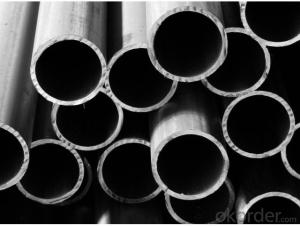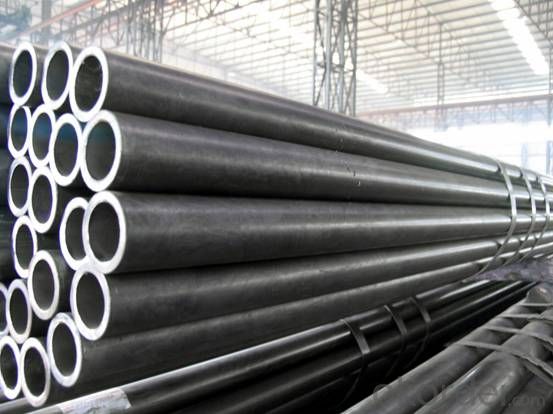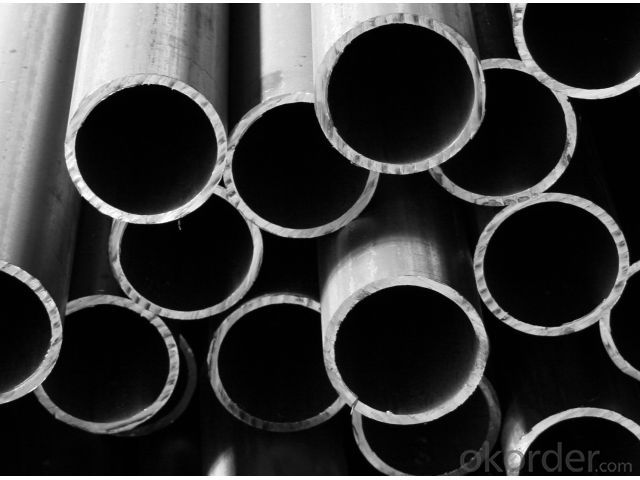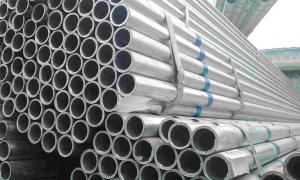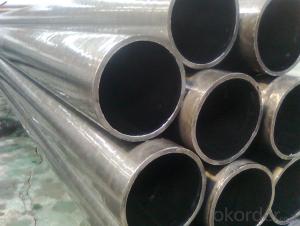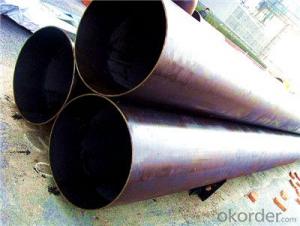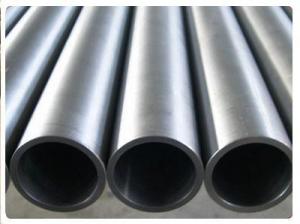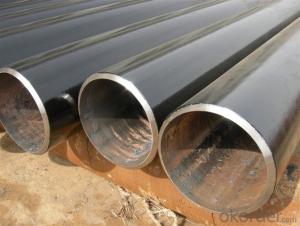Seamless Steel Alloy Pipe with Factory Price
- Loading Port:
- Qingdao
- Payment Terms:
- TT or LC
- Min Order Qty:
- 2000 PCS
- Supply Capability:
- 48000 PCS/month
OKorder Service Pledge
OKorder Financial Service
You Might Also Like
OKorder is offering high quality Seamless Steel Alloy Pipe at great prices with worldwide shipping. Our supplier is a world-class manufacturer of steel pipe, with our products utilized the world over. OKorder annually supplies products to European, North American and Asian markets. We provide quotations within 24 hours of receiving an inquiry and guarantee competitive prices.
Product Applications:
Seamless Steel Alloy Pipe is ideal for long distance oil, gas, and natural gas pipelines on land and offshore. They can also be applied in construction projects, offshore platforms, power stations, the petrochemical industry and municipal construction.
Product Advantages:
OKorder's Steel Pipe is durable, resists corrosion and is recyclable.
Main Product Features:
· Premium quality
· Prompt delivery & seaworthy packing (30 days after receiving deposit)
· Corrosion resistance
· Professional Service
· Competitive pricing
Product Specifications:
Grade: A213 A335 A199
Certification: Mill test certificate, EN 10204/31B
Dimensions:
Wall Thickness: 0.250" – 4.00" (hot finish), 0.035" – 0.875" (cold drawn)
Outer Diameter: 2" - 30" (hot finish), 0.875" - 18" (cold drawn)
Treatment: Annealed, fully annealed, bright annealed, spheroidize annealed, normalized, stress relieved, cold finished, quenched, tempered
Testing: Chemical component analysis, mechanical properties (ultimate tensile strength, yield strength, elongation), technical properties (flattening, flaring, bending, hardness, impact, etc), exterior size inspection
MOQ: 25 tons
Packaging: Bundle, beveled or plain end, varnish, PVC end caps
FAQ:
Q1: Why buy Materials & Equipment from OKorder.com?
A1: All products offered byOKorder.com are carefully selected from China's most reliable manufacturing enterprises. Through its ISO certifications, OKorder.com adheres to the highest standards and a commitment to supply chain safety and customer satisfaction.
Q2: How do we guarantee the quality of our products?
A2: We have established an advanced quality management system which conducts strict quality tests at every step, from raw materials to the final product. At the same time, we provide extensive follow-up service assurances as required.
Q3: How soon can we receive the product after purchase?
A3: Within three days of placing an order, we will begin production. The specific shipping date is dependent upon international and government factors, but is typically 7 to 10 workdays.
Q4: What makes stainless steel stainless?
A4: Stainless steel must contain at least 10.5 % chromium. It is this element that reacts with the oxygen in the air to form a complex chrome-oxide surface layer that is invisible but strong enough to prevent further oxygen from "staining" (rusting) the surface. Higher levels of chromium and the addition of other alloying elements such as nickel and molybdenum enhance this surface layer and improve the corrosion resistance of the stainless material.
Q5: Can stainless steel rust?
A5: Stainless does not "rust" as you think of regular steel rusting with a red oxide on the surface that flakes off. If you see red rust it is probably due to some iron particles that have contaminated the surface of the stainless steel and it is these iron particles that are rusting. Look at the source of the rusting and see if you can remove it from the surface.
Q6: What is the difference between galvanized steel and galvalume steel?
A6: Galvanized steel is metallic coated with Zinc in various coating weights. Minimum recommended for painted metal roofs is G90. Galvalume is a zinc and aluminum coated steel that becomes an alloy and is recommended in either painted or bare applications with a minimum coating weight of AZ50. Galvalume has an excellent performance life in bare exposures. Hence if you are using a bare panel use galvalume and if painted use either.
Q7: Is there a difference in thermal conductivity between stainless steel and steel?
A6: Yes. Stainless Steel has a lower thermal conductivity rate than steel; approximately 1/3 to 1/5th depending on the material.
Q8: Is there a difference in electrical conductivity between stainless steel and steel?
A8: Yes. Steel is generally more conductive than stainless steel. Steel has resistivity in the range of 10~20Ωm, while stainless has a resistivity of approximately 60~72Ωm.
Images:
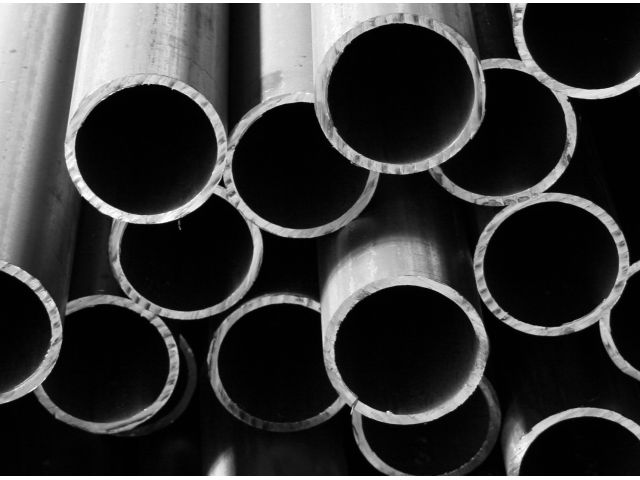
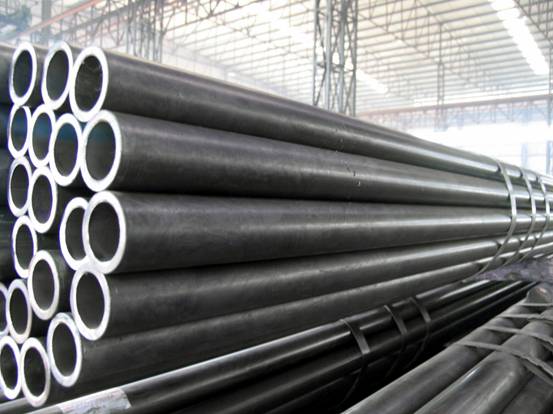
- Q: What are the standard dimensions for steel pipes?
- The standard dimensions for steel pipes vary depending on the application and industry. However, common sizes range from ½ inch to 48 inches in diameter and have various wall thicknesses based on the required strength and pressure rating.
- Q: What is the difference between steel pipes and copper-nickel pipes?
- The main difference between steel pipes and copper-nickel pipes lies in their composition and characteristics. Steel pipes are primarily made of iron and carbon, whereas copper-nickel pipes are made of a combination of copper and nickel with trace amounts of other elements. Steel pipes are known for their strength and durability, making them suitable for a wide range of applications, particularly in industries where high pressure and temperature conditions are present. Steel pipes are also relatively cost-effective and have good corrosion resistance, especially when coated or galvanized. On the other hand, copper-nickel pipes are highly resistant to corrosion and have excellent heat transfer properties. They are commonly used in marine environments due to their resistance to saltwater corrosion. Copper-nickel pipes also exhibit antimicrobial properties, making them suitable for applications in healthcare and food processing industries. However, copper-nickel pipes are generally more expensive than steel pipes. In summary, steel pipes are valued for their strength and affordability, while copper-nickel pipes offer superior corrosion resistance and heat transfer properties, but at a higher cost. The choice between the two depends on the specific requirements of the application.
- Q: How are steel pipes used in the construction of stadiums?
- Steel pipes are commonly used in the construction of stadiums for various purposes such as structural support, plumbing, and drainage systems. They provide strength, durability, and flexibility, making them ideal for constructing grandstands, roofs, and other large-scale structures. Additionally, steel pipes are used for installing plumbing systems to supply water for restrooms, concession stands, and irrigation. They also play a crucial role in the drainage system, allowing for efficient removal of rainwater and preventing flooding in the stadium. Overall, steel pipes are essential components in stadium construction due to their versatility and reliability.
- Q: What is the difference between cast iron and steel pipes?
- Cast iron pipes and steel pipes are commonly used in plumbing and construction, but they have distinct differences. Let's explore these disparities. 1. Composition: Cast iron pipes consist mainly of an iron alloy, with small amounts of carbon and other elements. Conversely, steel pipes are primarily composed of iron, but they also contain varying amounts of carbon and other alloying elements like manganese, chromium, and nickel. 2. Strength: Steel pipes generally surpass cast iron pipes in strength due to their higher carbon content and alloying elements. This makes steel pipes more suitable for high-pressure applications or areas with heavy loads. 3. Flexibility: Compared to cast iron pipes, steel pipes offer more flexibility, making installation and adjustment easier. Cast iron pipes, being brittle, are less flexible and more prone to cracking or breaking under excessive stress or impact. 4. Corrosion resistance: Steel pipes are usually more prone to corrosion than cast iron pipes. However, this can be mitigated with various protective coatings or treatments applied to the steel pipes. Cast iron pipes, on the other hand, possess inherent corrosion resistance due to the formation of a protective layer of rust on their surface. 5. Noise insulation: Cast iron pipes excel in noise insulation due to their dense and heavy composition. This makes them ideal for reducing noise in residential plumbing systems. Steel pipes, being lighter and less dense, do not offer the same level of noise insulation. 6. Longevity: When properly maintained, cast iron pipes have a lifespan of over 100 years. Steel pipes, while still durable, may have a shorter lifespan depending on factors like the quality of the steel used, environmental conditions, and maintenance practices. In conclusion, the primary differences between cast iron and steel pipes lie in their composition, strength, flexibility, corrosion resistance, noise insulation, and longevity. The choice between the two depends on specific requirements, such as desired strength, durability, and noise reduction properties.
- Q: What are the different methods of threading steel pipes?
- There are several methods of threading steel pipes, including manual threading, machine threading, and dielectric threading. Manual threading involves using a manual pipe threader or a handheld die to create the threads on the pipe. Machine threading, on the other hand, utilizes power-driven machines that can thread multiple pipes simultaneously, increasing efficiency and accuracy. Dielectric threading is a specialized method that uses a high-frequency electrical current to generate threads on the pipe, which is commonly used for stainless steel pipes.
- Q: How are steel pipes used in oil and gas industry?
- Steel pipes are widely used in the oil and gas industry for various applications. They serve as the primary means of transporting oil and gas from production sites to refineries and distribution centers. Steel pipes are also used for drilling operations, providing a conduit for drilling fluids and facilitating the extraction process. Additionally, they are utilized in the construction of storage tanks, offshore platforms, and pipelines, ensuring the safe and efficient transportation of oil and gas across long distances.
- Q: Can steel pipes be coated for aesthetic purposes?
- Indeed, steel pipes have the potential to be coated solely for aesthetic reasons. By applying coatings to steel pipes, not only can one achieve an attractive appearance, but also safeguard them against corrosion and other environmental influences. Numerous coating choices are at one's disposal when it comes to steel pipes, including powder coating, epoxy coating, and vinyl coating, among others. These coatings can be employed in various colors and textures to enrich the pipes' visual appeal and harmonize with their surroundings. Whether utilized in industrial settings, architectural endeavors, or for decorative purposes, the act of coating steel pipes has the power to metamorphose them into visually captivating components, all while preserving their structural integrity.
- Q: How are steel pipes protected against internal corrosion?
- Steel pipes are protected against internal corrosion through various methods, such as applying protective coatings or linings to the inner surface of the pipes. These coatings act as a barrier between the steel surface and the corrosive elements present in the transported fluids. Additionally, cathodic protection can be employed, where a sacrificial anode or an impressed current system is used to prevent corrosion by diverting the electrical current away from the steel surface. Regular maintenance and monitoring are also crucial to ensure the ongoing protection of steel pipes against internal corrosion.
- Q: How are steel pipes connected to other materials like concrete or plastic?
- Various methods are commonly employed to connect steel pipes to other materials such as concrete or plastic. Among these methods, fittings play a significant role. Fittings, specialized components, serve to facilitate the connection between different materials or sections of pipe. These fittings are available in a variety of shapes and sizes, including elbows, tees, reducers, and couplings, and are designed to establish a dependable and leak-proof connection. When it comes to connecting steel pipes to concrete, one method involves the utilization of concrete anchors. These anchors are embedded within the concrete structure and provide a stable foundation for securing the steel pipe. Clamps or brackets are subsequently employed to attach the pipe to the anchor. In the case of joining steel pipes to plastic materials, the use of transition fittings proves to be effective. These fittings are specifically crafted to connect steel pipes with plastic pipes. They typically feature different connection mechanisms on each end, such as threads or compression fittings, enabling a secure and reliable joint. Welding techniques can also be employed to connect steel pipes to other materials in certain situations. Welding involves melting the ends of the steel and the other material together to create a robust joint. This method is commonly utilized for connecting steel pipes to steel structures or components. In summary, the connection of steel pipes to materials like concrete or plastic necessitates the utilization of specialized fittings, anchors, or welding techniques. These methods guarantee a secure, long-lasting connection capable of withstanding the demands of the given application.
- Q: How are steel pipes used in the manufacturing of pulp and paper mills?
- Steel pipes are commonly used in the manufacturing of pulp and paper mills for various purposes such as transporting water, steam, chemicals, and other fluids throughout the facility. These pipes provide a durable and reliable solution for conveying materials and ensuring efficient operations in the pulp and paper industry.
Send your message to us
Seamless Steel Alloy Pipe with Factory Price
- Loading Port:
- Qingdao
- Payment Terms:
- TT or LC
- Min Order Qty:
- 2000 PCS
- Supply Capability:
- 48000 PCS/month
OKorder Service Pledge
OKorder Financial Service
Similar products
Hot products
Hot Searches
Related keywords

